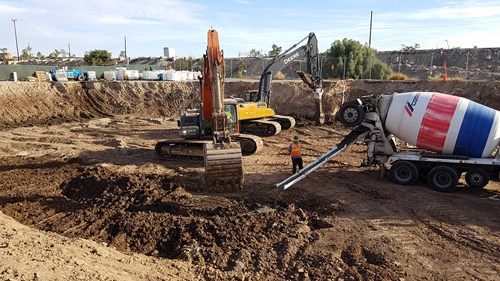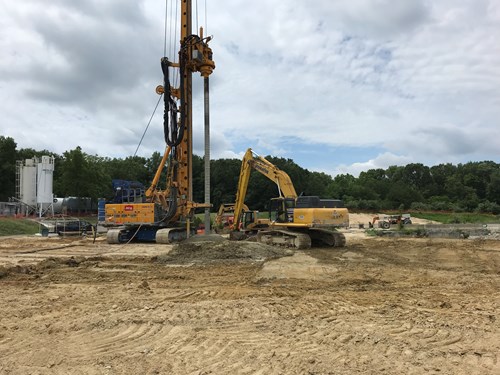What is In Situ Stabilization (ISS)? 
Stabilization (also known as chemical fixation) is a treatment process which reduces the hazard potential of a waste by converting the contaminants into their least soluble, least mobile, and least toxic form. Stabilization also reduces hydraulic conductivity below 1x10-6 cm/sec. This combination of reducing leachability and hydraulic conductivity locks contaminants within a monolithic matrix and eliminates the potential for exposure to the environment. ISS treatment can facilitate site redevelopment, as the high strength of the treated materials make an excellent subsurface/subbase for commercial or industrial construction.
The major advantage of ISS is that the contaminated media is treated in place. There is no need for a separate on-site treatment area and no need to consider ex situ material management methods, transportation logistics and costs associated with off-site treatment, disposal, and importation of clean backfill. Transport only becomes a concern if the final disposition of the treated material is off-site.
Our ISS Services 
Cascade provides clients with ISS and soil mixing services, which can be used alone or combined with other technologies to treat a variety of contaminated sites.
ISS can be combined with in situ chemical oxidation (ISCO) to destroy contaminants before impacted materials are locked in a solid matrix. ISS-ISCO provides an additional level of treatment to reduce concentrations before mixing with stabilization reagents to bind residual and non-oxidizable contaminants in place.
In addition to implementing full scale ISS programs, Cascade performs both bench-scale treatability studies and pilot-scale field testing. Treatability studies help define the technical and economic feasibility of potential ISS treatment solutions. Pilot testing fine tunes the means and methods required for full-scale implementation as well as validating formulations and economics resulting from bench-scale testing. Treatability studies and pilot scale field tests are important components of a successful ISS project.
Available ISS Technologies
A variety of common excavation and mixing equipment can be used for shallow ISS treatment. These include asphalt scarifiers, bulldozers, excavators, and tillers. Deep ISS mixing equipment utilizes augers suspended from cranes or drill rigs. The specific equipment chosen for a particular site will depend on many factors: the physical characteristics of the waste, depth and extent of the contamination, performance criteria for the stabilized material, and the required production rate. Numerous studies have compared excavator and auger ISS mixing side-by-side and have demonstrated that there is no discernible difference in the performance of the treated material due to the mixing equipment employed.